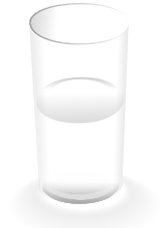As we begin our new theme this summer, Reading Life Differently, Check out this great post by Jeannie Kendall —
I always enjoy writing for Godspace, but I confess that a phrase in the latest update for writers sent a shiver down my spine. Or, perhaps more accurately, a slump to my shoulders.
 It was this: “What has helped change your perspective on life, faith and the world in which we live so that your cup is half full rather than half empty, full of love not burdened by hate?” – and very specifically the phrase in italics and bold.
It was this: “What has helped change your perspective on life, faith and the world in which we live so that your cup is half full rather than half empty, full of love not burdened by hate?” – and very specifically the phrase in italics and bold.
Why, you might ask, should this familiar and innocuous phrase cause such despair in me? Let me explain. You see, I have always (or at least as far back as I can remember, which is a lot of decades) been a glass half empty person. Various losses and traumas in early years, and a slightly peculiar upbringing in a remote hospital where my father was a doctor on staff, have left a certain underlying awareness of the fragility of life and my own frailty. Grief feels familiar. This is not to say my life is unhappy – there is much joy, in particular from my family. Yet still, perhaps I feel safer with the glass not too full, springing from that shadowy awareness from the early years how swiftly life can change.
So when I hear that glass half empty phrase, my initial response is guilt – that I shouldn’t feel like that, especially as (when here) it is linked with other qualities, like love, which I have tried to cultivate from the unpromising soil of my early years. I feel my half empty glass is yet another mark of my inherent failure. As a Christian, this is exacerbated by sometimes superficial teaching about God making everything come good – surely not the experiences of the Psalmist, to name just one group. Lament, they teach us, is godly.
So after reading that phrase, and immediately excusing myself from writing this time, I thought again. Because if a glass is half empty, there is room for new things to go in. It was my half empty glass that drove me in the first place to search for God, or more accurately recognise that he was searching for me. It was my half empty glass that meant that over the years I could sit with others in pain in companionable silence. It was my half empty glass that led to an identification with the struggles of various unnamed bible characters which in turn is about to lead to the publication of my first book, “Finding Our Voice”.
The half that is full is wonderful. But I will, without shame, leave a little space for anything that God, in his unlimited grace, might still want to pour in.


1 comment
I think that this message is great because she gives ways to remove anything that keeps one’s cup to be filled. So, as she is able to turn her problems to God, He can give one His answer and in the end, the cup gets full.
The example of a cup I use is like I am taking fresh water to put in glasses in a banquet, I know that there is nothing but
the Holy Spirit water that is inside. John. 7 v 39. So, my desire that when I teach that it is only the work of the Spirit that I minister.